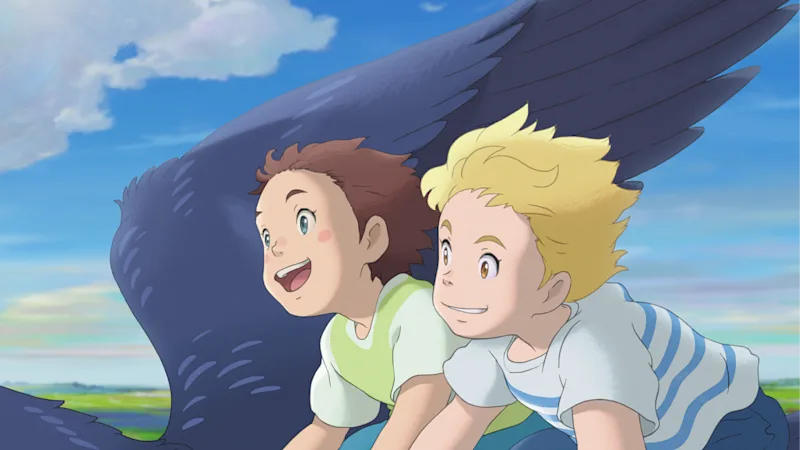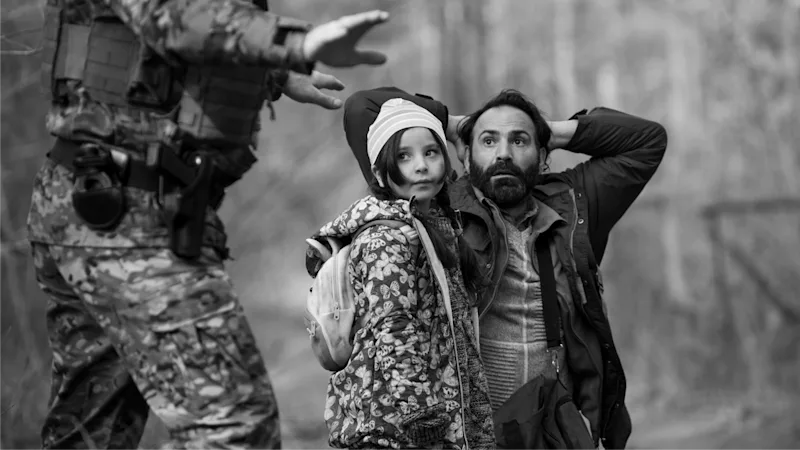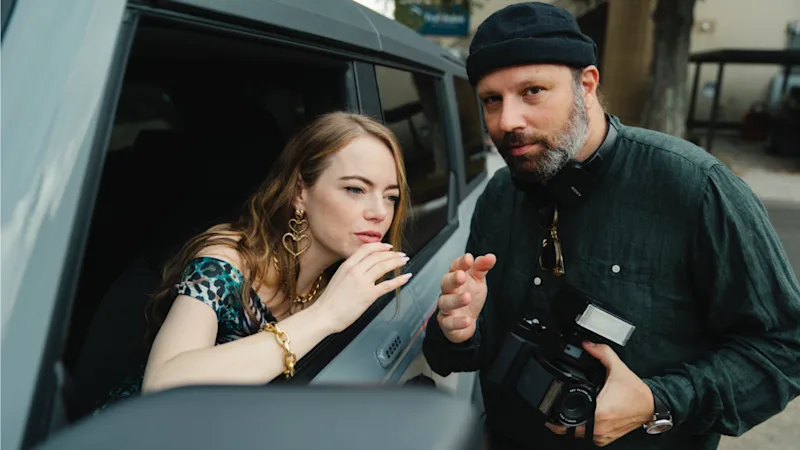Zora is a single mother living in London with her teenage daughter, willfully in denial about the girl's terminal illness until the arrival of death — or Death, as it were — forces Zora to come to terms with the inevitable. It's not a role one immediately would think of for Julia Louis-Dreyfus, who's spent the better part of the last 40 years making audiences laugh; however, for the director of Tuesday, Croatian-born filmmaker Daina O. Pusić, Louis-Dreyfus was the only choice.
"The role required the range of someone being an excellent comedian who could do nuanced drama, who could tackle this deep tragedy, and who had, frankly, the stones to go there," says Pusić. Watching the actress in Nicole Holofcener's Enough Said, Pusić felt that Louis-Dreyfus could bring all of that to the film. "There was just a rawness to how she expressed emotion. It was very, very strong, very real, very visceral, and it felt as if it was just the tip of the iceberg. Finding someone of that caliber to do that and to put themselves in such unfamiliar territory is also very rare. Julia became the obvious choice, and I really cannot imagine anyone else playing her at this point."
As fate would have it, Louis-Dreyfus had been looking for a departure from the comedic roles that she was known for. A meditation on death, and the stages of grief that come with it, certainly fit the bill.
"I was hoping to find something dramatic to really sink my teeth into, and when this came my way, I was immediately intrigued," Louis-Dreyfus says. "The script was also cuckoo bananas, as you can imagine, but I kind of got it."
In the film, Death arrives in the form of a shape-shifting, talking macaw. Tuesday (played by Lola Petticrew) appears ready for Death, and quickly finds herself bonding with the bird; her mother, on the other hand, sets out to stop Death in increasingly fantastical ways, which required Louis-Dreyfus to stretch herself further as an actress than she ever had before. Looking back now, she tells A.frame, "I took a leap of faith, and I'm so happy that I did."

Tuesday may mark Louis-Dreyfus' most dramatic role to date, but she approached playing Zora the same way she did Elaine, and Christine, and Selena. "You find your way in," she explains. "How can you understand in your bones who this woman is and how it is she's come to be in this moment? In other words, what parallels in your own life can you bring to this so that you understand her from the inside out?"
"Well, I'm a devoted mother of two, so I certainly understand the fierceness of the parent-child bond," Louis-Dreyfus says in answer to her questions. "I have lost people in my life who are very close to me, so I understand grief and the journey of grief and anticipating loss and then losing and being left behind. Those were places that I could go to to find my way in. So, it was only different because it required going to certain places emotionally that were challenging and painful."
"I love that moment when an actor comes in and takes the roles and makes it their own," Pusić says. "Because you want actors to explain things to you. You want them to look at the role and go, 'Here, look at it from this perspective,' and you go, 'Wow, was that there all along?!' And that's certainly what Julia did."
The origin of Tuesday is an early experience of loss that Pusić suffered during her teenage years, when a close friend of hers passed away to a degenerative illness. The film, for all of its magical surrealism, is deeply personal for the writer-director. You would be forgiven for assuming it was adapted from an obscure Eastern European fairytale; the film could just as conceivably be titled The Mother Who Ate Death. At one point, Zora does.
When she thinks back, that was the moment Louis-Dreyfus knew she would do Tuesday. "The moment when Zora physically beats Death to death — or so she thinks — and then, when it's apparent that she hasn't, she just eats Death. That, to me, was like, 'Oh yeah, I gotta do that. I totally get it. I understand the instinct to do it, and I need to do it.'"
Death is voiced by Nigerian-born British actor Arinzé Kene, who also performed the character on set. (Animators later animated the macaw to his performance.) In this particular sequence, just as Louis-Dreyfus describes it, Zora cripplers the bird with a textbook, sets it aflame, and then, in utter desperation, gobbles him up. As she swallows, she triumphantly — relievedly, shamefully, regretfully — wipes the ashes from her lips.
"We linger on her face, and I thought it was the most hilarious thing I had ever seen. It was so gratifying, so exciting to see that face," Pusić recalls. "Julia's range is massive, but it's also this really specific type of range where not only can you ask her to do different things like comedy and tragedy and horror, but she can do them at the same time! And that scene but especially that shot at the end, it really emphasizes that ability. I remember it being really tough night when we shot that, and afterward, we just looked at each other and burst out laughing."

Not every day ended with laughter, especially as Tuesday moves beyond anger and bargaining to the depression that comes before — and, just as often, after — acceptance. "It was hard. It was rough. I'm happy that I was in Daina's hands, because she was very sensitive to the challenges of the scenes that are more towards the end of the film, that are so painful," shares Louis-Dreyfus. "She cleared the set. It was very quiet, and we were able to get to the place we needed to get to."
"All I can say is that I felt safe," she says, "but it was hard to come down from that, and it took a few days for me to find my footing after we shot those scenes. They were hard... Frankly, I can't even really watch them."
She has watched them, though, and she felt relief, which is what you hope for on the other side of a leap of faith.
"It's absolutely exquisite, and to see it come together, it was just f--king magic," the actress says of the film. She's more measured when it comes to assessing her own performance in it. "I'm happy with my performance. I gave it my all, I left it all out there, and hopefully, I did my best. I tried my hardest, and I'm happy it worked out. I'm glad I'm not embarrassed, because that was honesty for me."
The reaction that has meant the most to her is from her children. She watched Tuesday for the first time with her eldest son, Henry, and simply says that it was an emotional experience. Both Henry and her younger son, Charlie, attended the premiere alongside their mom. "They were very moved by it, and so, I'm happy. Because they know me the best."
Tuesday is like nothing Louis-Dreyfus has done before, and for the actress, that was the point. Her next film is Marvel's Thunderbolts, which she recently wrapped and in which she reprises her role as Contessa Valentina Allegra de Fontaine. ("The Marvel thing, I had not done anything like that before.") As for what surprises are in store after that?
"You only know when it comes to you. I don't know what the next deal is yet," she says. "I just hope it's good."
By John Boone
RELATED CONTENT:
Julia Louis-Dreyfus: My 5 Favorite Films
Your Guide to 2024's Most-Anticipated Summer Movies
Jane Schoenbrun on Gender, Genre and 'I Saw the TV Glow' (Exclusive)







